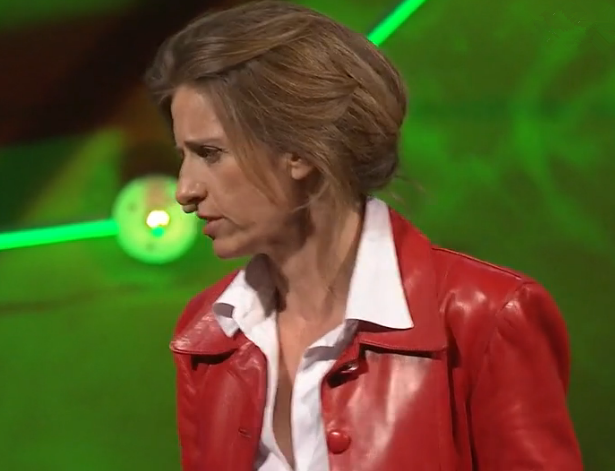Now around Chernobyl, there are scattered ghost villages,
如今切爾諾貝利附近到處是毫無人煙的村莊,
eerily silent, strangely charming, bucolic, totally contaminated.
靜得嚇人,詭譎迷人的氣息,一片荒蕪,完全受到污染。
Many were bulldozed under at the time of the accident,
在那次的意外中有許多房屋被鏟平,
but a few are left like this, kind of silent vestiges to the tragedy.
但是有一些遺留下來,就像這樣,有點像是災(zāi)難過后的死寂遺跡。
Others have a few residents in them, one or two "babushkas," or "babas,"
有一些居民住在這樣的房屋里,一到兩位“巴布希卡”或“巴巴”
which are the Russian and Ukrainian words for grandmother.
在俄語和烏克蘭語中指的是祖母。
Another village might have six or seven residents.
另一個村莊也許有六到七個居民,
So this is the strange demographic of the zone -- isolated alone together.
因此成了這個地區(qū)中特異的人口分布:孤零零的獨居與聚集。
And when I made my way to that piping chimney I'd seen in the distance,
當(dāng)我往前走向在遠(yuǎn)處看見那個冒著煙的煙囪,
I saw Hanna Zavorotnya, and I met her.
我看到漢娜·沃洛紐克,向前和她接觸。
She's the self-declared mayor of Kapavati village, population eight.
她是卡拉瓦帝村莊的自立村長,管轄八個人。
And she said to me, when I asked her the obvious, "Radiation doesn't scare me. Starvation does."
在我提出顯而易見的問題時,她告訴我:“輻射嚇不了我,餓肚子才會。”

And you have to remember, these women have survived the worst atrocities of the 20th century.
你得要記得,這些女性從20世紀(jì)最惡劣的環(huán)境中活過來了。
Stalin's enforced famines of the 1930s, the Holodomor, killed millions of Ukrainians,
斯大林在1930年代引起的烏克蘭大饑荒,造成上百萬名烏克蘭人死亡;
and they faced the Nazis in the '40s, who came through slashing, burning, raping,
而且他們在1940年代歷經(jīng)納粹人虐待、焚燒、性侵的暴行,
and in fact many of these women were shipped to Germany as forced labor.
而且事實上,其中有許多女性被運到德國做苦力。
So when a couple decades into Soviet rule, Chernobyl happened,
因此在蘇維埃政權(quán)生活數(shù)十年后,發(fā)生了切爾諾貝利事件,
they were unwilling to flee in the face of an enemy that was invisible.
他們不愿意因為這個看不見的敵人而離開。
So they returned to their villages and are told they're going to get sick and die soon,
因此他們回到自己的村莊,被告知會在短期內(nèi)生病、死亡,
but five happy years, their logic goes,
但是過了五年快樂的日子,他們理所當(dāng)然認(rèn)為
is better than 10 stuck in a high rise on the outskirts of Kiev,
這總好過十年被困在基輔郊區(qū)的高樓里,
separated from the graves of their mothers and fathers and babies,
這總好過被迫離開他們父母和孩子的墳?zāi)梗?/div>
the whisper of stork wings on a spring afternoon.
還有鸛鳥在春天午后翱翔時的吟唱聲。
For them, environmental contamination may not be the worst sort of devastation.
對他們來說,環(huán)境的污染也許不是最悲慘的蹂躪。
It turns out this holds true for other species as well.
結(jié)果對其它物種來說也同樣如此。
Wild boar, lynx, moose, they've all returned to the region in force,
大批的野豬、山貓、麋鹿都回到這個地區(qū),
the very real, very negative effects of radiation being trumped by the upside of a mass exodus of humans.
輻射造成的真實又消極影響已被一大群移出者戰(zhàn)勝了。
The dead zone, it turns out, is full of life.
死亡禁區(qū)反而變得欣欣向榮,
And there is a kind of heroic resilience,
有一種如英雄般的韌性,
a kind of plain-spoken pragmatism to those who start their day at 5 a.m. pulling water from a well
一種坦率的務(wù)實存在之中,他們在早上五點展開新的一天,從井中打水;
and end it at midnight poised to beat a bucket with a stick
結(jié)束一天的生活后,在夜里準(zhǔn)備劈好一桶木柴、
and scare off wild boar that might mess with their potatoes,
嚇跑那些會踐踏馬鈴薯田的野豬,
their only company a bit of homemade moonshine vodka.
唯一陪伴他們的是私釀伏特加。
And there's a patina of simple defiance among them.
在他們身上有些許挑釁的神情,
"They told us our legs would hurt, and they do. So what?"
“他們說我的腳會受傷,還真的受傷了,但是那又如何?”
I mean, what about their health?
然而,他們的身體健康嗎?
The benefits of hardy, physical living,
擁有身強體壯和物質(zhì)生活的好處,
but an environment made toxic by a complicated, little-understood enemy, radiation.
但是身在有毒的環(huán)境,面對一個復(fù)雜、所知甚少的敵人:輻射。
It's incredibly difficult to parse.
這個問題實在很難理清。



